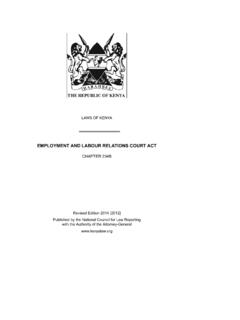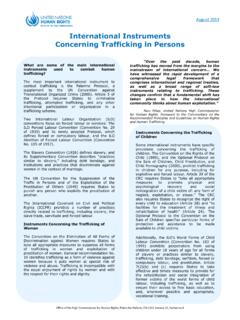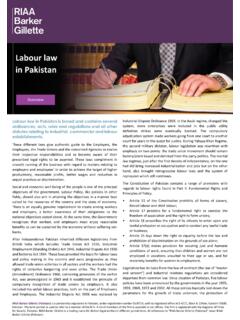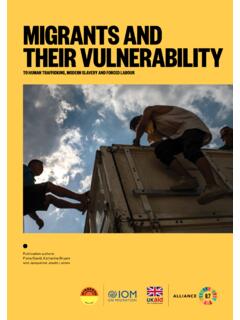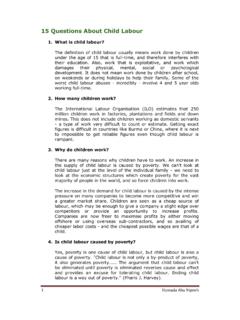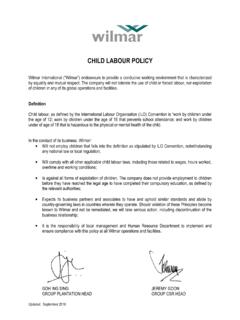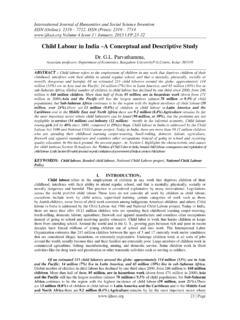Transcription of THE EMPLOYMENT ACT 2007 - Kenya Labour Market …
1 The EMPLOYMENT Act, 2007 1 THE EMPLOYMENT ACT, 2007 ARRANGEMENT OF SECTIONS Sections PART PRELIMINARY 1 Short title and commencement. 2 Interpretation 3 Application. PART II GENERAL PRINCIPLES 4 Prohibition against forced Labour . 5 Discrimination in EMPLOYMENT . 6 Sexual harassment. PART III EMPLOYMENT RELATIONSHIP 7 Contract of service. 8 Oral and written contracts. 9 General provision of contract of service. 10 EMPLOYMENT particulars. 11 Statement of initial particulars. 12 Statement on disciplinary rules. 13 Statement of changes. 14 Reasonably accessible document or collective agreement. 15 Informing employees of their rights. PART IV PROTECTION OF WAGES 16 Enforcement. 17 Payment, disposal and recovery of wages, allowances, etc. 18 When wages or salaries due. 19 Deduction of wages. 20 Itemised pay statement. 21 Statement of statutory deductions 22 Power to amend provisions on pay and statements of deductions.
2 23 Security bond for wages. 24 Death of an employee. The EMPLOYMENT Act, 2007 2 25 Repayment of remuneration wrongfully withheld or deducted. PART V RIGHTS AND DUTIES IN EMPLOYMENT 26 Basic minimum conditions of EMPLOYMENT . 27 Hours of work. 28 Annual leave. 29 Maternity leave. 30 Sick leave. 31 Housing. 32 Water. 33 Food. 34 Medical attention. PART VI TERMINATION AND DISMISSAL 35 Termination notice. 36 Payment in lieu of notice. 37 Conversion of casual EMPLOYMENT to term contract. 38 Waiver of notice by employer. 39 Contract expiring on a journey may be extended. 40 Termination on account of redundancy. 41 Notification and hearing before termination on grounds of misconduct. 42 Termination of probationary contracts. 43 Proof of reason for termination. 44 Summary dismissal. 45 Unfair termination. 46 Reasons for termination or discipline. 47 Complaint of summary dismissal and unfair termination.
3 48 Representation. 49 Remedies for wrongful dismissal and unfair termination. 50 Courts to be guided. 51 Certificate of service. PART VII PROTECTION OF CHILDREN 52 Interpretation. 53 Prohibition of worst forms of child Labour . 54 Complaint to the Labour officer or police officer. 55 Powers of Labour officer to cancel and prohibit contracts. The EMPLOYMENT Act, 2007 3 56 Prohibition of EMPLOYMENT of children between thirteen years and sixteen years of age. 57 Prohibition of written contracts for child between thirteen and sixteen years of age. 58 Restriction in employing child of between thirteen and sixteen years of age to attend machinery. 59 Time restriction in employing a child . 60 Emergencies. 61 Registers of child in EMPLOYMENT . 62 Medical examination of a child employee. 63 Determination of Age. 64 Penalty for unlawful EMPLOYMENT of child . 65 Penalty in case of death or injury. PART VIII INSOLVENCY OF EMPLOYER 66 Insolvency of employer.
4 67 Definition of insolvency. 68 Debts to which Part applies. 69 Limitation on amount payable under section 68. 70 Role of relevant officer. 71 Complaint to Industrial Court. 72 Transfer of rights and remedies. 73 Power to obtain information. PART IX EMPLOYMENT RECORDS 74 Records to be kept by employer. 75 False entries etc. PART X EMPLOYMENT MANAGEMENT 76 Notification of vacancies. 77 Notification of filling or abolition of post. 78 Notification of termination of EMPLOYMENT . 79 Register of employees. 80 Exemptions. 81 Offence under Part. The EMPLOYMENT Act, 2007 4 PART XI FOREIGN CONTRACTS OF SERVICE 82 Application of Part. 83 Form and attestation. 84 Requirement before attestation. 85 Security in foreign contract of service. 86 Offence to induce person to proceed abroad under informal contract. PART XII DISPUTES SETTLEMENT PROCEDURE 87 Complaint and jurisdiction in cases of dispute between employers and employees.
5 88 General penalty and offences under other laws. 89 Saving of Contracts of service made abroad. 90 Limitations. PART XIII MISCELLANEOUS PROVISIONS 91 Rules. 92 Repeal of and savings 93 Transitional Provision. The EMPLOYMENT Act, 2007 5 AN ACT of Parliament to repeal the EMPLOYMENT Act, declare and define the fundamental rights of employees, to provide basic conditions of EMPLOYMENT of employees, to regulate EMPLOYMENT of children, and to provide for matters connected with the foregoing. ENACTED by the Parliament of Kenya , as follows PART 1 PRELIMINARY Short title and commencement. 1. This Act may be cited as the EMPLOYMENT Act, 2007, and shall come into operation on such date as the Minister may, by notice in the Gazette, appoint. Interpretation. 2. In this Act, unless the context otherwise requires< authorised officer means a Labour officer, EMPLOYMENT officer or medical officer; Board means the National Labour Board; casual employee means a person the terms of whose engagement provide for his payment at the end of each day and who is not engaged for a longer period than twenty four hours at a time; child means a person who has not attained the age of eighteen years; collective agreement means a registered agreement concerning any terms and conditions of EMPLOYMENT made in writing between a trade union and an employer, group of employers or employers organization.
6 Contract of service means an agreement, whether oral or in writing, and whether expressed or implied, to employ or to serve as an employee for a period of time, and includes a contract of apprenticeship and indentured The EMPLOYMENT Act, 2007 6 learnership but does not include a foreign contract of service to which Part XI of this Act applies; dependent means a member of an employee s family or a relative who substantially depends on that employee for his livelihood; Director means a person appointed as the Director of EMPLOYMENT ; disability means a physical, sensory, mental or other impairment, including any visual, hearing, learning or physical incapability, which impacts adversely on a person s social and economic participation; employee means a person employed for wages or a salary and includes an apprentice and indentured learner; employer means any person, public body, firm, corporation or company who or which has entered into a contract of service to employ any individual and includes the agent, foreman, manager or factor of such person, public body, firm, corporation or company; forced or compulsory Labour means any work or service which is extracted from any person under the threat of any penalty ,including the threat of a loss of rights or privileges, which is not offered voluntarily by the person doing the work or performing the service; HIV means the Human Immune<Deficiency Virus; industrial undertaking includes (a) a mine, quarry and other works for the extraction of any substance from the surface or under the surface of the earth; (b) a factory or a place where raw materials are manufactured, processed or packaged.
7 The EMPLOYMENT Act, 2007 7 (c) the construction, reconstruction, maintenance, repair, alteration or demolition of any building, railway, tramway, harbour, dock, pier, canal, inland water way, road, tunnel, bridge, viaduct, sewer, drain, well, telegraphic or telephone installation, electrical undertaking, gas work, water work or other work of construction, as well as the preparation for or laying of the foundations of any such work or structure; or (d) transport of passengers or goods by road, rail, or inland waterway, including the handling of goods at docks, quays, wharves and warehouses, but excluding transport by hand: Provided that (i) the Minister, if he sees fit so to do, having regard to the nature of the work involved in any EMPLOYMENT carried on in any industrial undertaking, may by order declare that the EMPLOYMENT shall be excluded from the provisions of this Part relating to industrial undertakings, and thereupon the EMPLOYMENT shall be deemed not to be EMPLOYMENT in an industrial undertaking for the purposes of this Part; (ii) an undertaking of which a part only is an industrial undertaking shall not for that reason alone be deemed to be an industrial undertaking; Labour inspector means a person appointed as a Labour inspector.
8 Labour officer means a person appointed as the Commissioner of Labour , a Senior Deputy Commissioner of Labour , a Deputy Commissioner of Labour , an Assistant Commissioner of Labour , a Chief Industrial Relations Officer, a Deputy Chief Industrial Relations Officer, a The EMPLOYMENT Act, 2007 8 Senior Labour Officer, an Industrial Relations Officer or a Labour Officer; lockout means the closing of a place of EMPLOYMENT or the suspension of work or refusal by an employer to employ any employees (a) for the purpose of compelling the employees of the employer to accept any demand in request of a trade dispute; and (b) not for the purpose of finally terminating EMPLOYMENT . migrant worker means a person who migrates to Kenya with a view to being employed by an employer and includes any person regularly admitted as a migrant worker; mine includes an undertaking, whether public or private, for the extraction of a substance from the surface, or from under the surface of the earth.
9 Minister means the Minister for the time being responsible for Labour matters; organisation includes employees trade unions and employers organisations; parties means the parties to a contract of service; piece work means any work the pay for which is ascertained by the amount of work performed irrespective of the time occupied in its performance; probationary contract means a contract of EMPLOYMENT , which is of not more than twelve months duration or part thereof, is in writing and expressly states that it is for a probationary period; redundancy means the loss of EMPLOYMENT , occupation, job or career by involuntary means through no The EMPLOYMENT Act, 2007 9 fault of an employee, involving termination of EMPLOYMENT at the initiative of the employer, where the services of an employee are superfluous and the practices commonly known as abolition of office, job or occupation and loss of EMPLOYMENT ; Registrar means the Registrar of Trade Unions; remuneration means the total value of all payments in money or in kind, made or owing to an employee arising from the EMPLOYMENT of that employee.
10 Strike means the cessation of work by employees acting in combination, or a concerted refusal or a refusal under a common understanding of employees to continue to work, for the purpose of compelling their employer or an employers organization of which their employer is a member, to accede to any demand in respect of a trade dispute; task means such amount of work as can, in the opinion of an authorised officer, be performed by an employee in an ordinary working day; trade union means an association of employees whose principal purpose is to regulate relations between employees and employers and includes an employer s organisation; woman means a female of the age of eighteen years or above; worst form of child Labour with respect to juveniles, means their EMPLOYMENT , engagement or usage in any activity comprising of< (a) all forms of slavery or practices similar to slavery, such as the sale and trafficking of children, debt bondage and serfdom and forced or compulsory recruitment of children for use in armed conflict; The EMPLOYMENT Act, 2007 10 (b) the use, procuring or offering of a child for prostitution, for the production of pornography or for pornographic performances; (c) the use, procuring or offering of a child for illicit activities, in particular for the production and trafficking of drugs as define in the relevant international treaties; (d) work which, by its nature or the circumstances in which it is carried out, is likely to harm the health, safety or morals of the child .
